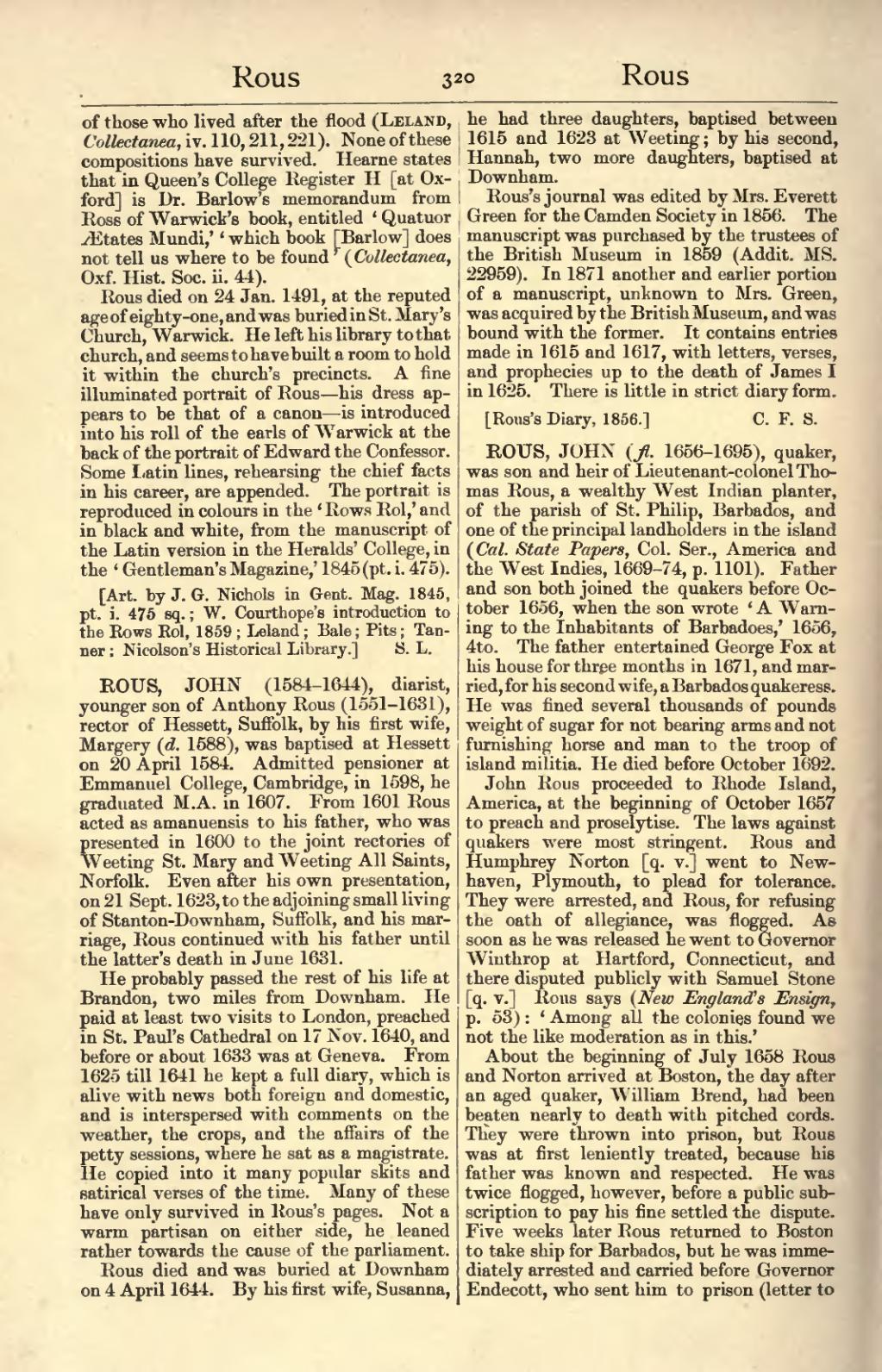of those who lived after the flood (Leland, Collectanea, iv. 110, 211, 221). None of these compositions have survived. Hearne states that in Queen's College Register H [at Oxford] is Dr. Barlow's memorandum from Ross of Warwick's book, entitled ‘Quatuor Ætates Mundi,’ ‘which book [Barlow] does not tell us where to be found’ (Collectanea, Oxf. Hist. Soc. ii. 44).
Rous died on 24 Jan. 1491, at the reputed age of eighty-one, and was buried in St. Mary's Church, Warwick. He left his library to that church, and seems to have built a room to hold it within the church's precincts. A fine illuminated portrait of Rous—his dress appears to be that of a canon—is introduced into his roll of the earls of Warwick at the back of the portrait of Edward the Confessor. Some Latin lines, rehearsing the chief facts in his career, are appended. The portrait is reproduced in colours in the ‘Rows Rol,’ and in black and white, from the manuscript of the Latin version in the Heralds' College, in the ‘Gentleman's Magazine,’ 1845 (pt. i. 475).
[Art. by J. G. Nichols in Gent. Mag. 1845, pt. i. 475 sq.; W. Courthope's introduction to the Rows Rol, 1859; Leland; Bale; Pits; Tanner; Nicolson's Historical Library.]
ROUS, JOHN (1584–1644), diarist, younger son of Anthony Rous (1551–1631), rector of Hessett, Suffolk, by his first wife, Margery (d. 1588), was baptised at Hessett on 20 April 1584. Admitted pensioner at Emmanuel College, Cambridge, in 1598, he graduated M.A. in 1607. From 1601 Rous acted as amanuensis to his father, who was presented in 1600 to the joint rectories of Weeting St. Mary and Weeting All Saints, Norfolk. Even after his own presentation, on 21 Sept. 1623, to the adjoining small living of Stanton-Downham, Suffolk, and his marriage, Rous continued with his father until the latter's death in June 1631.
He probably passed the rest of his life at Brandon, two miles from Downham. He paid at least two visits to London, preached in St. Paul's Cathedral on 17 Nov. 1640, and before or about 1633 was at Geneva. From 1625 till 1641 he kept a full diary, which is alive with news both foreign and domestic, and is interspersed with comments on the weather, the crops, and the affairs of the petty sessions, where he sat as a magistrate. He copied into it many popular skits and satirical verses of the time. Many of these have only survived in Rous's pages. Not a warm partisan on either side, he leaned rather towards the cause of the parliament.
Rous died and was buried at Downham on 4 April 1644. By his first wife, Susanna, he had three daughters, baptised between 1615 and 1623 at Weeting; by his second, Hannah, two more daughters, baptised at Downham. Rous's journal was edited by Mrs. Everett Green for the Camden Society in 1856. The manuscript was purchased by the trustees of the British Museum in 1859 (Addit. MS. 22959). In 1871 another and earlier portion of a manuscript, unknown to Mrs. Green, was acquired by the British Museum, and was bound with the former. It contains entries made in 1615 and 1617, with letters, verses, and prophecies up to the death of James I in 1625. There is little in strict diary form.
[Rous's Diary, 1856.]
ROUS, JOHN (fl. 1656–1695), quaker, was son and heir of Lieutenant-colonel Thomas Rous, a wealthy West Indian planter, of the parish of St. Philip, Barbados, and one of the principal landholders in the island (Cal. State Papers, Col. Ser., America and the West Indies, 1669–74, p. 1101). Father and son both joined the quakers before October 1656, when the son wrote ‘A Warning to the Inhabitants of Barbadoes,’ 1656, 4to. The father entertained George Fox at his house for three months in 1671, and married, for his second wife, a Barbados quakeress. He was fined several thousands of pounds weight of sugar for not bearing arms and not furnishing horse and man to the troop of island militia. He died before October 1692.
John Rous proceeded to Rhode Island, America, at the beginning of October 1657 to preach and proselytise. The laws against quakers were most stringent. Rous and Humphrey Norton [q. v.] went to Newhaven, Plymouth, to plead for tolerance. They were arrested, and Rous, for refusing the oath of allegiance, was flogged. As soon as he was released he went to Governor Winthrop at Hartford, Connecticut, and there disputed publicly with Samuel Stone [q. v.] Rous says (New England's Ensign, p. 53): ‘Among all the colonies found we not the like moderation as in this.’
About the beginning of July 1658 Rous and Norton arrived at Boston, the day after an aged quaker, William Brend, had been beaten nearly to death with pitched cords. They were thrown into prison, but Rous was at first leniently treated, because his father was known and respected. He was twice flogged, however, before a public subscription to pay his fine settled the dispute. Five weeks later Rous returned to Boston to take ship for Barbados, but he was immediately arrested and carried before Governor Endecott, who sent him to prison (letter to

